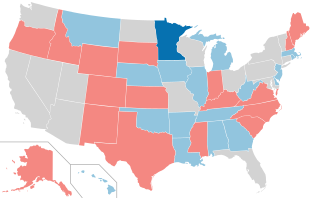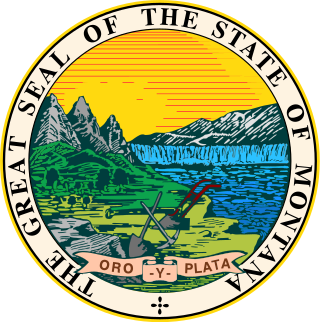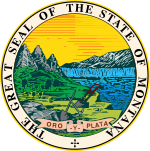
Dennis Ray Rehberg is an American politician and member of the Republican Party. He served as the lieutenant governor of Montana from 1991 to 1997 and as the U.S. representative for Montana's at-large congressional district from 2001 to 2013. Rehberg was the Republican nominee for the United States Senate in 1996 and 2012, losing to Democratic incumbents Max Baucus 50% to 45% and Jon Tester 49% to 45%, respectively. He subsequently became a co-chairman at Mercury, a Washington D.C. lobbying firm.

The 1996 United States Senate elections were held on November 5, 1996, with the 33 seats of Class 2 contested in regular elections. Special elections were also held to fill vacancies. They coincided with the presidential election of the same year, in which Democrat Bill Clinton was re-elected president.

The 1990 United States Senate elections were held on Tuesday, November 6, 1990, with the 33 seats of Class 2 contested in regular elections. Special elections were also held to fill vacancies. The Democratic Party increased its majority with a net gain of one seat from the Republican Party. The election cycle took place in the middle of President George H. W. Bush's term, and as with most other midterm elections, the party not holding the presidency gained seats in Congress. This was the first time since 1980 that any party successfully defended all their own seats, and the first time Democrats did so since 1958.

The 1984 United States Senate elections were held on November 6, with the 33 seats of Class 2 contested in regular elections. They coincided with the landslide re-election of President Ronald Reagan in the presidential election. In spite of the lopsided presidential race, Reagan's Republican Party suffered a net loss of two Senate seats to the Democrats, although it retained control of the Senate with a reduced 53–47 majority.

The 1978 United States Senate elections were held on November 7, in the middle of Democratic President Jimmy Carter's term. The 33 seats of Class 2 were contested in regular elections. Special elections were also held to fill vacancies.

The 1976 United States Senate elections was an election for the United States Senate. Held on November 2, the 33 seats of Class 1 were contested in regular elections. They coincided with Democrat Jimmy Carter's presidential election and the United States Bicentennial celebration. Although almost half of the seats decided in this election changed parties, Carter's narrow victory did not provide coattails for the Democratic Party. Each party flipped seven Senate seats, although, one of the seats flipped by Democrats was previously held by a Conservative.

The 1964 United States Senate elections were held on November 3. The 33 seats of Class 1 were contested in regular elections. Special elections were also held to fill vacancies. They coincided with the election of President Lyndon B. Johnson by an overwhelming majority, to a full term. His Democratic Party picked up a net two seats from the Republicans. As of 2023, this was the last time either party has had a two-thirds majority in the Senate, which allowed the Senate Democrats to override a veto, propose constitutional amendments, or convict and expel certain officials without any votes from Senate Republicans. However, internal divisions would have prevented the Democrats from having done so. The Senate election cycle coincided with Democratic gains in the House in the same year.

The 2008 United States Senate election in Montana was held on November 4, 2008. Incumbent Senator Max Baucus won re-election to a sixth term in a landslide, winning more than 70% of the vote and carrying every county in the state, despite Republican John McCain's narrow victory in the state in the concurrent presidential election. Baucus later resigned his seat on February 6, 2014, after the Senate confirmed him to be U.S. Ambassador to China, having already announced his intention to retire at the end of term on April 23, 2013. As of 2024, this is the last time Democrats won the Class 2 Senate seat in Montana.

Michael R. Cooney is an American politician who served as the 36th lieutenant governor of Montana from 2016 to 2021. He previously served in the Montana House of Representatives (1977–1981), as the secretary of state of Montana (1989–2001), in the Montana Senate (2003–2011), as the president of the Montana Senate (2007–2009) and ran unsuccessfully for Governor of Montana in 2000. Cooney was the Democratic nominee for governor of Montana in the 2020 election, losing to Republican U.S. Representative Greg Gianforte.

The 2014 United States Senate elections were held on November 4, 2014. A total of 36 seats in the 100-member U.S. Senate were contested. 33 Class 2 seats were contested for regular 6-year terms to be served from January 3, 2015, to January 3, 2021, and 3 Class 3 seats were contested in special elections due to Senate vacancies. The elections marked 100 years of direct elections of U.S. senators. Going into the elections, 21 of the contested seats were held by the Democratic Party, while 15 were held by the Republican Party.

The 2012 United States Senate election in Montana was held on November 6, 2012, alongside a presidential election, other elections to the United States Senate in other states, as well as elections to the United States House of Representatives and various state and local elections.

The 2014 United States Senate election in Montana took place on November 4, 2014, to elect a member of the United States Senate from Montana, concurrently with other elections to the United States Senate in other states and elections to the United States House of Representatives and various state and local elections.

The 2002 United States House of Representatives election in Montana was held on November 5, 2002, to determine who will represent the state of Montana in the United States House of Representatives. Montana had one at-large district in the House, apportioned according to the 2000 United States census, due to its low population. Representatives are elected for two-year terms.

The 2014 congressional election in Montana was held on November 4, 2014, to elect the U.S. representative from Montana's at-large congressional district. Between 1993 and 2023, Montana had one at-large seat in the House.

The 1978 United States Senate election in Montana took place on November 7, 1978. Following the death of United States Senator Lee Metcalf on January 12, 1978, Montana Supreme Court Chief Justice Paul G. Hatfield was appointed to serve for the remainder of Metcalf's term. Hatfield opted to run for a full term, but was overwhelmingly defeated in the Democratic primary by U.S. Representative Max Baucus of the 1st congressional district. Baucus advanced to the general election, where he was opposed by the Republican nominee, author Larry R. Williams. Baucus ended up defeating Williams by a solid margin to win his first term in the Senate, and, following Hatfield's resignation on December 12, 1978, he began serving his first term in the Senate.

The 1984 United States Senate election in Montana took place on November 6, 1984. Incumbent United States Senator Max Baucus, who was first elected in 1978, ran for re-election. He easily won renomination in the Democratic primary, and advanced to the general election, where he faced Chuck Cozzens, a former State Representative and the Republican nominee. Despite President Ronald Reagan's strong performance in the state that year, Baucus was able to easily win a second term over Cozzens.

The 1990 United States Senate election in Montana took place on November 6, 1990. Incumbent United States Senator Max Baucus, who was first elected in 1978 and was re-elected in 1984, ran for re-election. After winning the Democratic primary, he moved on to the general election, where he was opposed by Allen Kolstad, the Lieutenant Governor of Montana and the Republican nominee. Baucus ultimately ended up defeating Kolstad in a landslide, winning his third term with ease.

The 2016 Montana gubernatorial election took place on November 8, 2016, to elect the Governor and Lieutenant Governor of Montana, concurrently with the 2016 U.S. presidential election, as well as elections to the United States Senate and elections to the United States House of Representatives and various state and local elections.

John Brian Driscoll is an American writer and politician who served in the Montana House of Representatives from 1973 to 1979.

The 2024 United States House of Representatives elections in Montana will be held on November 5, 2024, to elect the two U.S. representatives from the state of Montana, one from each of the state's congressional districts. The elections will coincide with the U.S. presidential election, as well as other elections to the House of Representatives, elections to the United States Senate, and various state and local elections. The primary elections took place on June 4, 2024.























